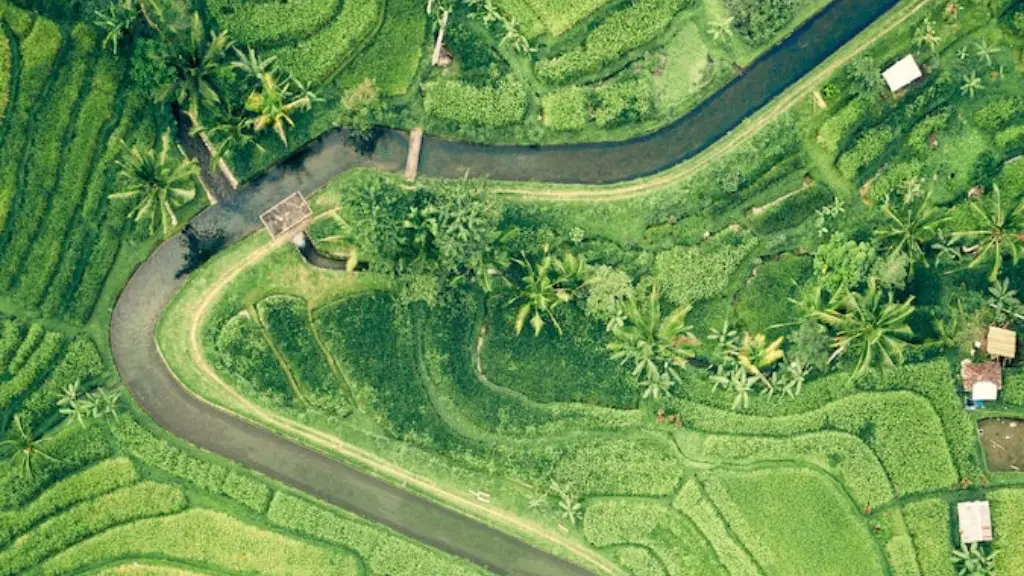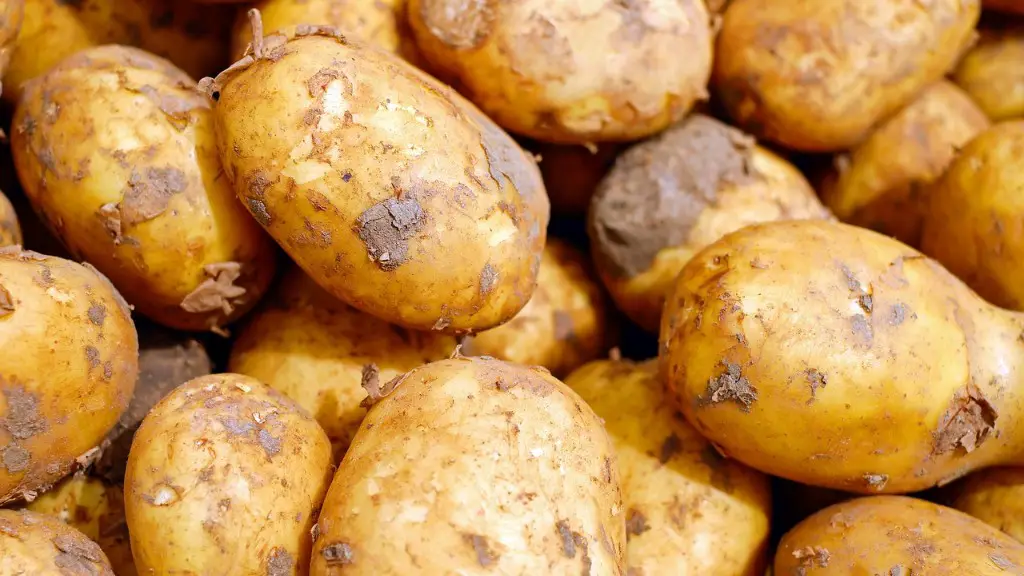Salt water is not typically used for agricultural purposes because it is too salty for plants to absorb. However, there are some species of plants that can tolerate salt water and are therefore able to be cultivated in salt water. These plants are typically found in salt marshes and coastal areas.
No, salt water cannot be used for agriculture.Salt water is too salty for plants to grow in. Fresh water is needed for agriculture.
Can farming be done with salt water?
This is an exciting development with the potential to help solve the global food crisis. Seawater is a abundant resource, and if we can learn to cultivate crops that can thrive in salt water, it could open up vast new areas for agriculture. The government of the Netherlands is to be commended for their work in this area, and I hope that other countries will follow their lead in researching and developing this technology.
Desalination is a process that can remove salt from water, but it is expensive and requires a lot of energy. It also has other environmental impacts, like producing carbon dioxide emissions. So, while it is technically possible to move water from the ocean into areas that are experiencing water shortages, it is not a practical solution on a large scale.
What plants can grow with salt water
Looking for a plant that can withstand high levels of salt? Check out our top picks for the best salt-tolerant plants! From Adam’s needle to bee balm, these plants can thrive in even the saltiest conditions. So if you’re looking to add a little bit of green to a salty environment, look no further than our top picks for the best salt-tolerant plants!
Dissolved salts can directly affect the plant by stopping the water uptake by the roots of the plant. This can happen if the salt concentration is high. The salts can also be deposited into the soil where the roots grow. This can happen if the concentration of the salt is high.
Can salt water be used as fertilizer?
Did you know that ocean water is perfect fertilizer? Most people think seawater kills plants Right out of the ocean it does, just like any other fertilizer that is not diluted properly; but delivered in the proper concentration seawater is actually an amazing fertilizer.
Seawater contains all of the essential nutrients that plants need in order to grow. In fact, many commercial fertilizers are made from concentrated seawater. The benefits of using seawater as fertilizer are many. It is a renewable resource, it is readily available, and it is very effective.
If you are interested in using seawater as fertilizer, there are a few things you need to keep in mind. First, you need to make sure that you dilute the seawater properly. Second, you need to be aware of the nutrients that are in seawater so that you can apply them in the proper amounts. And third, you need to be aware of the possible side effects of using seawater as fertilizer.
When used properly, seawater can be an amazing fertilizer. It is a renewable resource, it is readily available, and it is very effective. If you are interested in using seawater as fertilizer, make sure that you do your research and you understand the proper way to
Desalination is the process of removing salt and other minerals from water. The first desalination technology to be developed was thermal distillation. In this process, saline water is distilled into steam, which in turn is condensed into pure water. Later, membrane processes, such as electro-dialysis (ED) and reverse osmosis (RO), were developed.
ED and RO are both membrane processes that use pressure to force water through a semipermeable membrane. The difference between the two is that ED uses electricity to drive the process, while RO relies on osmotic pressure. Both processes are effective at removing salt and other minerals from water, making it safe to drink.
Why doesn t California use desalination?
The state of California has been hit hard by drought in recent years, and water officials have been searching for new ways to increase the state’s water supply. One option that has been proposed is desalination, which is the process of removing salt from seawater to make it potable.
However, state regulators have recently rejected a proposal for a $14 billion desalination plant in Huntington Beach, citing the high costs of the water, potential risks to marine life, and hazards associated with sea level rise and flooding.
Given the state of California’s drought crisis, it’s unclear whether this decision will be reconsidered. However, it highlights the challenges associated with desalination as a potential solution to the state’s water woes.
The problem with desalinating water is that it is very energy intensive. Salt easily dissolves in water and forms strong chemical bonds. These bonds are difficult to break and require a lot of energy to do so. Additionally, the technology needed to desalinate water is also very expensive. This makes the process of desalinating water very costly overall.
Is sea water drinkable if boiled
Seawater is not safe to drink because it is full of salt. Boiling the water does not remove the salt, so it is still not safe to drink. Freshwater from a river can be boiled to make it safe enough to drink.
Mangroves are a fascinating type of plant that have adapted to thrive in some of the most difficult growing conditions. They are able to tolerate salt water, muddy soil, and even coral rock. This makes them an important part of the ecosystem in tropical and subtropical areas.
Can seeds grow in salt water?
Salt stress is a major issue for crops, as it can reduce a seed’s ability to absorb water and causes an ion imbalance. This can ultimately inhibit germination and prevent crop production. Therefore, growing standard crops in the face of SWI can risk crop failure.
Sodium and chloride ions are found in high concentrations in salt. When salt is dissolved in water, these ions separate and can displace other mineral nutrients in the soil. Plants absorb chlorine and sodium instead of needed plant nutrients such as potassium and phosphorus, leading to deficiencies.
Why is salt water bad for soil
If the level of salts in the soil water is too high, water may flow from the plant roots back into the soil. This results in dehydration of the plant, causing yield decline or even death of the plant. Crop yield losses may occur even though the effects of salinity may not be obvious.
Desalination is a process in which dissolved mineral salts are removed from water. This process is most commonly used to obtain fresh water for human consumption or agricultural purposes from seawater. Desalination is energy intensive, so it is important to consider the cost and energy required for this process when choosing a water source.
Can you water your garden with ocean water?
Animals in the ocean deposit minerals and other chemicals into the water column as they move about. These minerals eventually find their way into the seafloor. Over time, the minerals are leached up into the water column from the seafloor, where they are taken up by plants. The plants then deposit the minerals into the soil as they decay. Thus, ocean water is a potentially great source of minerals for your garden.
If you applied saltwater to a plant, the saltwater would draw water out of the plant cell’s vacuole. The water would then leave the vacuole to try and bring the concentration of the extra-cellular environment to equilibrium with the cell’s interior environment.
Can you water your grass with salt water
While it is not recommended to irrigate with seawater, a few golf courses are forced to use brackish water for the golf course. This allows the construction of courses in places where fresh water may not be available either physically or politically. The high salt content in seawater can damage plants, and the salt can build up in the soil, making it difficult for plants to grow.
Salinity is the saltiness of water. The salinity of irrigation water can have a significant impact on crops. Extremely high salinity generally makes irrigation water unsuitable for most crops, unless the soils are permeable and well-drained, and the crops are of very high salt tolerance.
Final Words
No, we cannot use salt water for agriculture.
Yes, we can use salt water for agriculture. Salt water is a good source of nutrients for plants, and it can help to improve plant growth.





